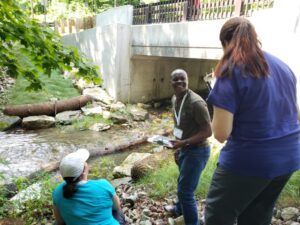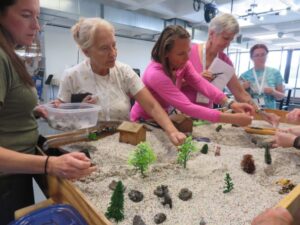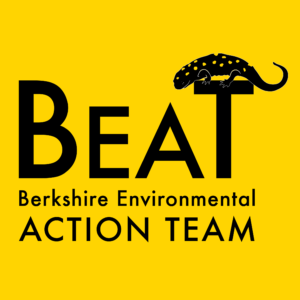This course was offered as part of Accelerating Science: Open Access Professional Learning Courses for Massachusetts educators. Eligible Massachusetts educators were able to take this course for free with a $450 stipend. Learn more about OAPL by visiting our OAPL page.
Watershed Science and Engineering in the Berkshires
A 5-Day Summer Professional Development Institute for Grades 6-12 Educators
An Approved Course for MA DESE’s Accelerating Science: Open Access Professional Learning
 During this weeklong Institute for 6-12 educators, participants spent a week in the Berkshires collaborating with local scientists, engineers, conservation organizations and higher education faculty to explore how engineering supports natural systems and habitats. They explored methods and resources to bring this locally relevant science to their students and help them recognize the range of career opportunities that engineering can offer.
During this weeklong Institute for 6-12 educators, participants spent a week in the Berkshires collaborating with local scientists, engineers, conservation organizations and higher education faculty to explore how engineering supports natural systems and habitats. They explored methods and resources to bring this locally relevant science to their students and help them recognize the range of career opportunities that engineering can offer.
Our home base for the week was the Berkshire Science Commons at Berkshire Community College (BCC) – an exciting new resource for teachers in the Berkshire Region, where the community can collaborate with BCC faculty and staff and access amazing science and engineering tools and resources. Our partner at the Berkshire Science Commons helped introduced us to the engineering design process through a Tinker CAD design project, and set the stage for our Institutes’ engineering design challenges.
 Our week continued in the field with partners from The Berkshire Environmental Action Team and the Berkshire Community College Science Department, and the City of Pittsfield Engineering Department, who brought us out into the local ecosystems as we explored local rivers and streams. With our partners we worked to understand first-hand how important watersheds are, to investigate methods in use to protect them and to understand how environmental needs and urban planning needs can develop together. We applied the engineering strategies we observed in the field to a stream table at the Berkshire Science Commons, working to minimize erosion and runoff.
Our week continued in the field with partners from The Berkshire Environmental Action Team and the Berkshire Community College Science Department, and the City of Pittsfield Engineering Department, who brought us out into the local ecosystems as we explored local rivers and streams. With our partners we worked to understand first-hand how important watersheds are, to investigate methods in use to protect them and to understand how environmental needs and urban planning needs can develop together. We applied the engineering strategies we observed in the field to a stream table at the Berkshire Science Commons, working to minimize erosion and runoff.
While at our field locations we also learned state water quality monitoring protocols, conducted these tests at the Berkshire Science Commons, and explored and practiced ways to scale this testing to be used in the classroom. We also toured the local wastewater treatment plant, learning first-hand how engineering and natural processes are used in tandem to return fresh water to our ecosystem.
Our week concluded with a return to our engineering design challenges, including the creation and testing of mini wastewater treatment plants. Throughout the week educators gained an understanding of how phenomena-based learning, storyline teaching, and inquiry investigations could help their students meet engineering and science standards.
This course was FREE for eligible MA educators through MA DESE’s Accelerating Science: Open Access Professional Learning Courses.



